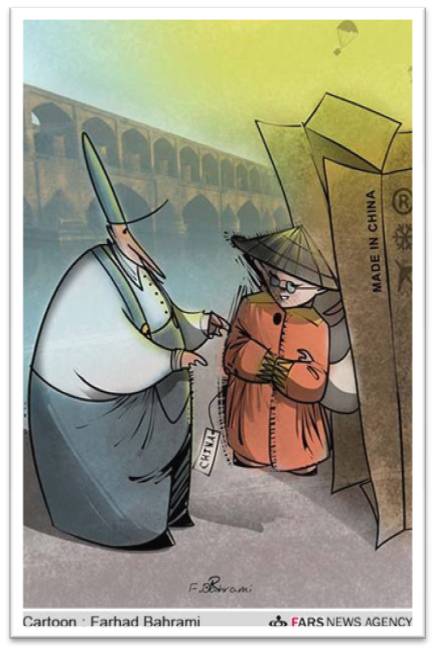CHINA'S POLICY TOWARD IRAN - A GENERAL REAPPRAISAL & FUTURE PROSPECTS

Number 47 ● 10 January 2012
CHINA'S POLICY TOWARD IRAN - A GENERAL REAPPRAISAL & FUTURE PROSPECTS
Hongda Fan*
Sino-Iranian relations are a very sensitive issue in China. Although major Chinese media and academic journals have not always given the issue a prominent place in their publications, China's policy towards Iran has generated increasing interest among local Chinese scholars and citizens.
China and Iran have a long history of courteous and friendly relations that dates back more than two thousand years. Prior to the formation of People’s Republic of China (PRC) in 1949, there was a history of military cooperation, trade and business activity, as well as cultural exchange which has contributed to the historical bond between China and Iran. Bilateral relations between the two countries have evolved and perhaps grown since the Iranian revolution in 1978/9.
Currently China considers the Islamic Republic of Iran to be an important Middle Eastern strategic partner. Beijing's relations with Tehran have several dimensions. The first relates to oil and gas. In 1993 China became a net oil importer for the first time, a development that had important implications for its energy development. China's seemingly insatiable demand for hydrocarbons is well known; and Iran is China's third-largest crude oil supplier, after Saudi Arabia and Angola. Shipments of Iranian oil reached 23.15 million tons in 2009, accounting for 11.4 percent of China's total crude imports. Yet, in light of China's urgent energy needs, it is worth bearing in mind that future advances in renewable energies, may also affect the direction of Sino-Iranian relations.
Second, China’s relations with its Muslim population in the northwest region benefits – somewhat indirectly -- from China's relations with Iran. The separatist activity of the Muslim Uighur Turkic ethnic group in Xinjiang province has concerned Beijing for some time. Beijing believes that maintaining good relations with peripheral Muslim states, particularly Turkey and Iran, mitigates any potential involvement by these states on behalf of China's Uighurs in Xinjiang province.
Third, China also sees trade and non-oil commerce with Iran as an important aspect of their relationship. China is constantly searching for overseas markets for its manufactured goods, and Iran is perceived as an important Middle Eastern trade partner. In 2009, China became Iran's premier foreign trade partner with bilateral trade worth $21.2 billion and Chinese companies directly supplying Iran with 13 percent ($7.9 billion) of its imports. Furthermore, because China has invested commercially in Iran, it is fair to assume that China will give the Islamic Republic of Iran more attention in the future in order to ensure a safe and profitable return on its investment.
 The fourth component of Sino-Iranian relations is related to international politics. Although China is a recognized rising power in the international arena, it has faced continuous challenges from other powers. In order to maintain its international standing, China is hoping to extend its network of international supporters, particularly developing countries like the Islamic Republic of Iran.
The fourth component of Sino-Iranian relations is related to international politics. Although China is a recognized rising power in the international arena, it has faced continuous challenges from other powers. In order to maintain its international standing, China is hoping to extend its network of international supporters, particularly developing countries like the Islamic Republic of Iran.
In addition to these elements, China's policy towards Iran is influenced by other issues as well. First, the possibility of future developments inUS-Iranian relationsmay also affect China's foreign policy towards the Islamic Republic. If Iran and the US normalize relations, then Tehran might move toward more profitable commercial ties with the US and the EU and away from trade with China, especially with regard to advanced technologies. Therefore, in a potential scenario of a US-Iranian rapprochement, China, regarded as an aggressive rival by the US and the EU at certain times in the past, may reconsider its relations with the Islamic Republic of Iran.
Second, China's position as a permanent member of UN Security Council enables Beijing to play a crucial role in international relations. The attitudes of other (major) powers towards Beijing on issues like China's prominent role in the ongoing Iranian nuclear crisis may also affect Chinese foreign policy in many respects and have an impact on its relations with Iran. However, if Beijing believes it is a world power then it must act like one and actively participate in solving problems in other regions in the world.
Ultimately China’s policy towards Iran depends upon its own national interests. On the other hand, China’s interests in Iran are not fixed or permanent/unwavering. Therefore, China’s policy towards Iran is dynamic and susceptible to change, and the nature of the relationship between Iran and China can also be expected to evolve and adapt to the rapidly changing international and regional political developments■
* Dr. Hongda Fan is a post-doctorate fellow at the Center for Iranian Studies 2010-11.
T h e A l l i a n c e C e n t e r f o r I r a n i a n S t u d i e s ( A C I S )
Tel Aviv University, Ramat-Aviv 61390, Tel Aviv P.O.B. 39040, Israel
Email: IranCen@post.tau.ac.il Phone: +972-3-640-9510
F a x : + 9 7 2 - 3 - 6 4 0 - 6 6 6 5
Iran Pulse No. 47 ● January 10, 2012
© All rights reserved

